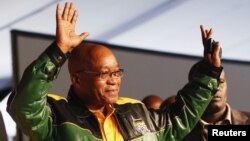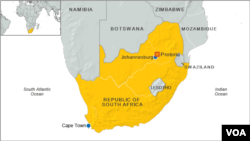JOHANNESBURG —
South Africa’s President Jacob Zuma is visiting Angola, Africa’s third largest economy, and the continent's second-biggest oil producer. This is Mr. Zuma’s second trip since 2009, and he is expected to shore up economic and political ties with an aim to increase South African exports and cooperation in the oil sector.
South Africa and Angola have long had tight diplomatic and economic ties, but South African officials said they want to pick up the pace of trade with the southern African oil giant.
Foreign ministry spokesman Clayson Monyela said Zuma and Angolan President Jose Eduardo dos Santos will discuss how to advance other existing agreements, but that trade is the focus of Wednesday’s visit.
“The main concern for South Africa in particular is that there has been a slow progress with regards to the implementation of those agreements," said Monyela. "This visit today is supposed to [clear] whatever blockages may be there, particularly in the area of trade. The country of Angola remains a major trade partner and we are quite keen to take the trade figures to a higher level.”
Angola’s main exports to South Africa are petroleum and diamonds, with petroleum products accounting for nearly 90 percent of the trade.
Angola’s government recently announced a plan to increase its oil production to 1.84 million barrels a day. In Africa, only Nigeria produces more than that.
South Africa is the continent’s economic powerhouse, with the highest gross domestic product in Africa.
The World Economic Forum last year also ranked South Africa as the continent’s most competitive economy. It’s the only African nation in the G20 group of the world’s top 20 economies. South Africa is also the newest member of BRICS, a group of emerging economies comprising Brazil, Russia, India and China.
That group said building Africa’s poor and ailing infrastructure is a priority, and the group plans to start its own development bank to address such issues - though it’s not yet clear whether the bank will loan only to its five members, or beyond.
The majority of Angola’s infrastructure was destroyed during a decades-long civil war that ended in 2002, and the lack of proper roads, public services and transport lines has hurt the nation’s competitiveness.
Zuma’s first state visit as president was to Angola.
South Africa and Angola have long had tight diplomatic and economic ties, but South African officials said they want to pick up the pace of trade with the southern African oil giant.
Foreign ministry spokesman Clayson Monyela said Zuma and Angolan President Jose Eduardo dos Santos will discuss how to advance other existing agreements, but that trade is the focus of Wednesday’s visit.
“The main concern for South Africa in particular is that there has been a slow progress with regards to the implementation of those agreements," said Monyela. "This visit today is supposed to [clear] whatever blockages may be there, particularly in the area of trade. The country of Angola remains a major trade partner and we are quite keen to take the trade figures to a higher level.”
Angola’s main exports to South Africa are petroleum and diamonds, with petroleum products accounting for nearly 90 percent of the trade.
Angola’s government recently announced a plan to increase its oil production to 1.84 million barrels a day. In Africa, only Nigeria produces more than that.
South Africa is the continent’s economic powerhouse, with the highest gross domestic product in Africa.
The World Economic Forum last year also ranked South Africa as the continent’s most competitive economy. It’s the only African nation in the G20 group of the world’s top 20 economies. South Africa is also the newest member of BRICS, a group of emerging economies comprising Brazil, Russia, India and China.
That group said building Africa’s poor and ailing infrastructure is a priority, and the group plans to start its own development bank to address such issues - though it’s not yet clear whether the bank will loan only to its five members, or beyond.
The majority of Angola’s infrastructure was destroyed during a decades-long civil war that ended in 2002, and the lack of proper roads, public services and transport lines has hurt the nation’s competitiveness.
Zuma’s first state visit as president was to Angola.









